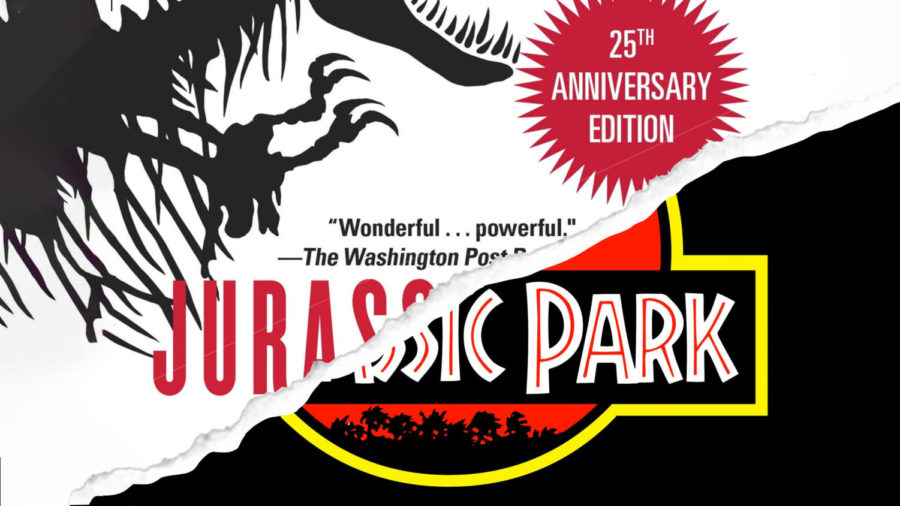
THE MIRROR | DAIMLER KOCH
It might surprise most younger viewers, but the 1993 film is actually an adaptation of a 1990 novel written by Michael Crichton, an M.D. whose background helped him create the genetic aspect of Jurassic Park’s plot.
First things first: I’m not attacking the film adaptation of Jurassic Park, the original movie released back in 1993. That movie’s fantastic. Great plot, terrifying antagonists, unforgettable characters (“We spared no expense…”).
Unfortunately, the same can’t be said about the book it was based on.
I read Jurassic Park before I ever watched it. At the time, I thought it was decent. Written by Micheal Crichton, it was pretty typical of novels of its era: stacked with pages from cover to cover, typed in cheap tiny print, and somewhat fast-paced. Somewhat.
But when I watched the film adaptation, my perception of the book changed greatly.
So, instead of this being a typical film or book review, I’d like to compare the two and argue why the book is crappier than the movie.
The book starts off slow. Mysterious, but slow. Someone’s been bit by an unknown animal (guess who?), and they’ve been flown to a Costa Rican hospital. No one, however, will tell the doctors who the patient is or what he got bit by, even as he bleeds to death through his clothes. Again, slow but mysterious.
The movie’s obviously different. I don’t recall, for example, there being a drop of blood in the opening scene. And no one gets flown to a hospital, nor do they have a true medical professional on scene in case of an “accident”. Yet, I find that the movie foreshadows the future bloodshed and sets the tone for the rest of the story far better than the book. Who can forget the screaming face of the worker trapped between the cage and the outside, between life and death, as so many of the characters will find themselves later in the movie? Meanwhile, all the book does is cause a trifling sense of curiosity in its opening moments, which is fine, I guess, but it’s far too calm and confusing to give us any sense of the plot. We know the mysterious animal is a dinosaur; the book’s called Jurassic Park, that’s why we picked it up off the shelf, saw the “New York Times Bestseller” phrase typed across the top, said “aw, what the hell?” and bought it. We know (or think) that dinosaurs are robotically violent predators, and while the movie reinforces that stereotype greatly from the beginning, it takes a long time for the book to do so.
The paces, too, are different. Crichton has a somewhat unusual beat. The slow parts are protracted, the fast parts ephemeral. It takes Grant five pages to get through a shallow conversation with two kids, yet only a sentence for a person to get their head ripped off. When I initially read the book nearly a year ago, I thought it was a decent effect, but after I watched the movie, which has a consistently dramatic pace throughout, I began to see the effect as choppy, getting in the way of the reader. Some might argue that it makes the dinosaur attacks unpredictable, but I disagree. Crichton hints way too far in advance when someone is going to get attacked, rendering the effect useless.
The third problem the book faces is character development. Everyone lacks dimensionality. Grant, whose disdain for kids is obvious from his first appearance on the screen, doesn’t seem to have much of a problem with them in the book. Satler’s not the caring and rational antidote to Grant’s cold studiousness; she’s just his associate working in the field. Perhaps the character with the biggest change from page to screen is Hammond, whose signature egoism is surprisingly lacking in the book (no “We spared no expense…”), and the only one who remained somewhat consistent is Malcolm, who, in both the book and the movie, constantly voices his conviction that the park will fail due to the mathematical functions of entropy (chaos) in the universe. Even the kids seem to be lacking the energy they had in the movie, as if Crichton couldn’t find a way to make them annoying or stubborn enough. In the book, everyone’s a lifeless puppet, shoved in there by Crichton’s fingers against their will, and we have to watch these cold beings flop around, panic, and die, even though there’s nothing about them that would make us give a damn about their sufferings.
I can’t say much more about the book, except that if you have watched the movie, then you’ll probably be let down by Crichton.
Jurassic Park is a typical action novel of the early ‘90s. It was written during a time when books were written only to be bestsellers, when they came in smooth softcover and tiny print, when they placed a racing plot above everything else. Whereas Jurassic Park is a typical Spielberg blockbuster of the early ‘90s. It wasn’t made necessarily for the money, but for the experience. Spielberg, and others like him, pushed for the latest advancements in technology and for believable characters and unparalleled storytelling. They didn’t settle for the same formula, to have the glory of being acclaimed by the New York Times like the millions of other stories out there. Spielberg spared no expenses in bringing the book to life, and as a result, he left the book to die in its own shallowness.
